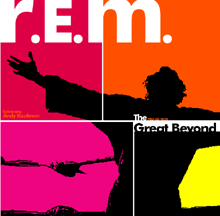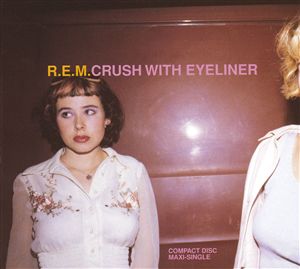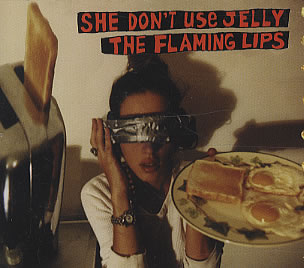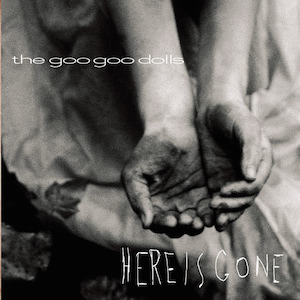
"What's the Frequency, Kenneth?" is a song by American alternative rock band R.E.M. from their ninth studio album, Monster (1994). The song's title refers to an incident in New York City in 1986 in which two then-unknown assailants attacked journalist Dan Rather while repeating "Kenneth, what is the frequency?"

"The Great Beyond" is a song by American rock band R.E.M., written for the 1999 film Man on the Moon. It was released as a single the same year for support of the film's soundtrack album. On the soundtrack, there is some dialogue from the movie at the end of the track; meanwhile, the single version is a radio edit, with the bridge omitted.

"Everybody Hurts" is a song by American rock band R.E.M. from their eighth studio album, Automatic for the People (1992), and released as a single in April 1993 by Warner Bros. Records. It peaked at number 29 on the US Billboard Hot 100, but fared much better on the US Cash Box Top 100, where it peaked at number 18. The song also reached the top 10 on the charts of Australia, Canada, France, Iceland, Ireland, the Netherlands, and the United Kingdom. Its music video was directed by Jake Scott and filmed in San Antonio, Texas. In 2003, Q ranked "Everybody Hurts" at number 31 on their list of the "1001 Best Songs Ever", and in 2005, Blender ranked the song at number 238 on their list of "Greatest Songs Since You Were Born".

"Jetstream" is the thirtieth single by English band New Order. Released through Warner Bros. Records on 16 May 2005, it is the second single to be taken from their eighth studio album, Waiting for the Sirens' Call (2005). The song features Scissor Sisters member Ana Matronic on additional vocals. "Jetstream" charted at number 20 in the United Kingdom and number 30 in Ireland. The music video for the song is the first to feature the band since 1993's "World ".

"Crush with Eyeliner" is a song by American rock band R.E.M., released by Warner Bros. Records as the third single from their ninth studio album, Monster (1994). Sonic Youth's Thurston Moore provides background vocals. Michael Stipe claims the song was inspired by the band New York Dolls, who, in his opinion, "knew how to exaggerate a song, to make it sound really sleazy and over the top." This was also one of the first songs that surfaced from Stipe after the writer's block that hounded him after the death of his friend, actor River Phoenix.

"Bang and Blame" is a song by American alternative rock group R.E.M. It was released as the second single from their ninth studio album, Monster (1994), on October 31, 1994 by Warner Bros. Records. The song was R.E.M.'s last to reach the top 40 on the US Billboard Hot 100, peaking at number 19, and was also their last number-one single on the Billboard Modern Rock Tracks chart. The single reached number one in Canada—R.E.M.'s only single to do so—and peaked inside the top 40 on the charts of Australia, Belgium, Finland, Iceland, Ireland, the Netherlands, New Zealand, and the United Kingdom.

"Strange Currencies" is a song by American rock band R.E.M. It was included on their ninth studio album, Monster (1994), and was released as the album's fourth single on April 18, 1995, by Warner Bros. Records. The song reached number nine on the UK Singles Chart and peaked at number 47 in the United States. Like "Everybody Hurts" on R.E.M.'s previous album, it has a time signature of 6
8. The song's music video was directed by Mark Romanek.

"Tongue" is a song by American rock band R.E.M., released on July 17, 1995 by Warner Bros. Records, as the fifth and final single from their ninth studio album, Monster (1994). The song was only released in the US, UK, and Ireland. In the song, lead singer Michael Stipe performs in falsetto; he has stated on several occasions that the narrator of the song is female. Stipe has also said the track is "all about cunnilingus".

"The Sidewinder Sleeps Tonite" is a song by American alternative rock band R.E.M. It was influenced by the song "The Lion Sleeps Tonight", both in the title of the song and through the song's opening refrain. The band used "The Lion Sleeps Tonight" as the B-side to this song in the U.S. The song was released on R.E.M.'s 1992 album, Automatic for the People, and was later released as a single in February 1993, reaching number one in Iceland, number 13 in Ireland, number 17 in the United Kingdom, and number 29 in New Zealand. Its music video was directed by Kevin Kerslake.

"Drive" is a song by American alternative rock band R.E.M. It is the first track on and the lead single from their eighth studio album, Automatic for the People (1992), and was the first song lead singer Michael Stipe wrote on a computer. "Drive" peaked at number 28 on the US Billboard Hot 100, number one on the Billboard Modern Rock Tracks chart, and number two on the Billboard Album Rock Tracks chart. Internationally, "Drive" became R.E.M.'s then-second-biggest hit on the UK Singles Charts, peaking at number 11, and their biggest hit in Norway until "Supernatural Superserious" in 2008, reaching number three. Elsewhere, the song reached the top 10 in Canada, Ireland, New Zealand, and Switzerland.

"Secret Love" is a song by musical group the Bee Gees. It was released as the lead single from their 19th studio album, High Civilization (1991), on 18 February 1991 by Warner Bros. Records. It is an up-tempo song with a Supremes style similar to the 1986 Diana Ross hit "Chain Reaction", which was also written by the Bee Gees. The single reached the top 10 in several European countries, but was not released as a single in the United States.

"I Owe You Nothing" is a song by British boy band Bros. Written by Nicky Graham and Tom Watkins and produced by Graham, the song was originally released as their debut single in 1987 but failed to chart. In 1988, it was remixed and re-released by CBS following the success of their breakthrough single "When Will I Be Famous?". The original version of the song can be found on the band's 1988 debut album, Push.

"She Don't Use Jelly" is a song by American rock band the Flaming Lips from their sixth studio album, Transmissions from the Satellite Heart (1993). It reached number 55 on the US Billboard Hot 100 and became a top-30 hit in Australia.

"Don't Wanna Fall in Love" is a song by Canadian singer-songwriter Jane Child. Released in January 1990 as the second single from her first album, Jane Child, the single went to number 2 for three consecutive weeks on the Billboard Hot 100 from April 14 to April 28, 1990. In addition, a new jack swing remix of the song was produced by Teddy Riley and reached number 6 on the Billboard Hot Black Singles chart and number 11 on the Billboard Dance Club Play chart.

"Here Is Gone" is a song by American rock band Goo Goo Dolls. A song about yearning for a deeper relationship with someone, "Here Is Gone" was released on March 11, 2002, as the lead single from the band's seventh studio album, Gutterflower (2002). It reached number 18 on the US Billboard Hot 100 chart and number three on the Adult Top 40. The single also reached number 17 in New Zealand, becoming the group's second top-20 hit there.

"Where Have All the Cowboys Gone?" is a song by American singer Paula Cole. It was released to radio in September 1996 before being physically released on March 25, 1997, as the lead single from her second studio album, This Fire. The song is Cole's only top-ten hit on the US Billboard Hot 100, reaching number eight, and was her first top-ten hit in Canada, where it reached number seven. It was additionally a critical success, earning nominations for three Grammy awards: Record of the Year, Song of the Year, and Best Female Pop Vocal Performance.

"Had Enough" is a song by British rock band the Enemy from their debut studio album, We'll Live and Die in These Towns (2007). Released on 25 June 2007, "Had Enough" became the band's highest-charting single in the United Kingdom, peaking at number four on the UK Singles Chart in July 2007.

"Constant Craving" is a song written by Canadian singer-songwriter k.d. lang and Ben Mink, performed by lang and included on her second solo album, Ingénue (1992). The song was released in the United Kingdom in April 1992 and won lang a Grammy Award in the category for Best Female Pop Vocal Performance in 1993, as well as an MTV Video Music Award for Best Female Video. The accompanying music video was directed by Mark Romanek.

"Can't Stop Lovin' You" is a song by American band Van Halen. It was released in March 1995 as the third single from their 10th album, Balance (1995). The song emerged after producer Bruce Fairbairn asked for a more pop-oriented song. Instead of searching for his archives, Eddie Van Halen decided to write new music from scratch. The song was written by all members of Van Halen and pays homage to Ray Charles' song "I Can't Stop Loving You", particularly in the line where Sammy Hagar sings "Hey Ray, what you said is true..."

"Brilliant Mind" is a song by British new wave band Furniture, released in 1986 by Stiff as the lead single from their second studio album The Wrong People. It was written by Jim Irvin, Hamilton Lee, Sally Still and Tim Whelan, and produced by Mick Glossop. "Brilliant Mind" reached number 21 on the UK Singles Chart and remains the band's only entry on the chart.




















